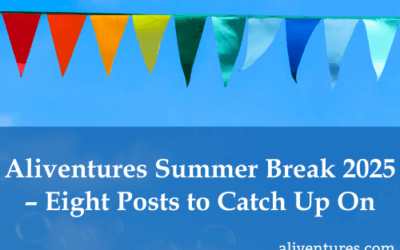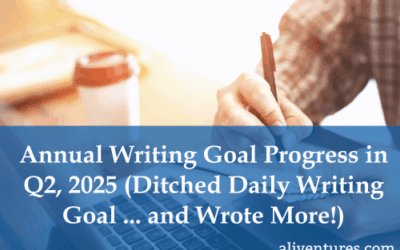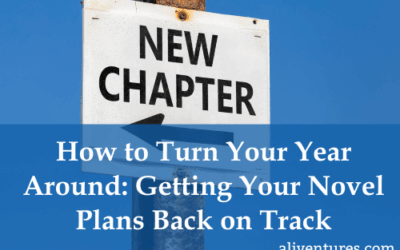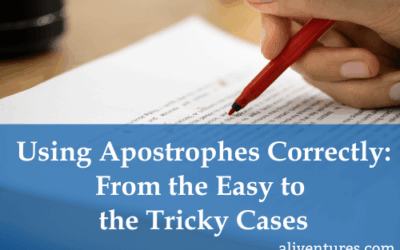Welcome to the Aliventures blog!
Want to write better, finish what you start, or tackle that novel you’ve been dreaming about? You’re in the right place! Choose an options below, scroll down for recent posts, or take a look at the Start Here page.
Aliventures Summer Break 2025 – Eight Posts to Catch Up On
Summer’s here in the UK and I’ll be taking some time off from blogging. I’ll still be sending the Aliventures newsletter weekly (though it may not always be on a Monday over the summer). To get that, just pop your email address in here: If you have some downtime over...
What is Subtext in Fiction – and How Can You Use it in Your Writing?
Subtext is what’s unspoken or implied. It’s what lies beneath the surface-level meaning of what someone says or does. We’re all familiar with subtext in everyday life. Let’s say a family member asks, “Have you lost weight?” There could be all kinds of subtext: perhaps...
Annual Writing Goal Progress in Q2, 2025 (Ditched Daily Writing Goal … and Wrote More!)
We’re halfway through 2025 – how’s your writing been going so far this year? If you’re hitting your goals, fantastic! Take a moment this week to celebrate. 🙂 If it’s not going quite how you wanted, that’s okay. You’ve still got six months…
Writing Dialogue: Eight Straightforward Tips (Plus Examples)
Unless you’re creating flash fiction or something decidedly experimental, writing dialogue is essential. Great dialogue can immerse the reader in your book, your world, and most especially your characters. Poor dialogue jars the reader and may even see them put…
About
I’m Ali Luke, and I live in Leeds in the UK with my husband and two children. Aliventures is where I help you get your novel all the way to “the end”.
Archives
Just head on over to the Archive:
Why You Should Stick to One Name for Each Character in Your Novel
This post was first published in April 2018 and last updated in June 2025. You’re probably known by several different names in your life. I'm "Ali Luke" to Aliventures readers. I’m “Alison Luke” when I fill in a form. I’m “Mrs Luke” to my bank and to cold-callers. I’m...
What Are Supporting Characters? (Mentors, Best Friends, Love Interests, and More)
Your novel needs a protagonist (main character) … but unless you’re writing something highly unusual and experimental, you’ll have a cast of more than just that one person. Some of the characters in your story will have walk-on roles: the waiter who brings your...
How to Turn Your Year Around: Getting Your Novel Plans Back on Track
How’s 2025 been going for you? Maybe you started the year feeling enthusiastic and motivated: this was going to be the year you finished your novel. But we’re close to halfway through the year now, and perhaps things haven’t quite gone to plan. Novels often take...
What Are Supporting Characters? (Mentors, Best Friends, Love Interests, and More)
Your novel needs a protagonist (main character) … but unless you’re writing something highly unusual and experimental, you’ll have a cast of more than just that one person. Some of the characters in your story will have walk-on roles: the waiter who brings your...
How to Turn Your Year Around: Getting Your Novel Plans Back on Track
How’s 2025 been going for you? Maybe you started the year feeling enthusiastic and motivated: this was going to be the year you finished your novel. But we’re close to halfway through the year now, and perhaps things haven’t quite gone to plan. Novels often take...
Using Apostrophes Correctly: From the Easy to the Tricky Cases
I think it’s a safe bet that you’ve come across the apostrophe before. (If not … there are two in the previous sentence.) However, quite a few writers struggle with using apostrophes correctly. And that can really damage your credibility…








